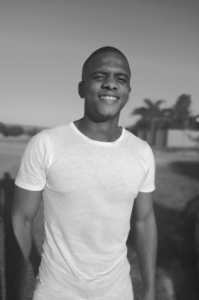To be able to take charge, you need to listen to your body
by Lonwabo Nene, South Africa

“I don’t know, but my right arm feels loose. In fact, my entire right side feels kind of loose. But at the same time – tight.” That was the first time I actually tried to describe the symptoms I had been feeling for a really long time.
Perplexed, the good doctor responded, “But that’s not possible. Something that’s loose cannot also be “tight.”
I can only imagine the encounters you have had with your doctor the first time you tried to tell them of your FSHD symptoms. I was 16 then, and although I had good physical awareness, I lacked the proper knowledge of physiology and its descriptive terms.
Now, although I am not a physician of any kind, I can at least articulate the mystifying symptoms that one may feel with muscular dystrophy.
FSHD is unique, and while intense efforts are being made to bring about a cure, we cannot afford to sit idly by until that day. We need to take it upon ourselves to come up with new and creative ways to help us deal with our day-to-day challenges. This requires a holistic approach and will be subjective in its methods, as each person’s FSHD is not the same as another’s.
Let’s take mobility, for example. You will recall how I mentioned to my doctor the way I felt “tight” and “loose” all at the same time. This was along the right-hand side of my body, from my face down to my foot. Well, that tightness was my inability to fully extend my right arm all the way above my head, while the looseness in my back was due to the protruding scapula whenever I tried a pushing motion against resistance.
These contradictory-sounding symptoms are difficult to explain to anybody else. This is why I strongly believe each of us needs to take charge, listening to our bodies and paying attention to whichever changes may occur over time.
Just as important, try to find the time to learn more about the symptoms you have and their proper descriptions, as this will allow you to articulate them more effectively and have a deeper understanding of how to improve or manage your particular case.
This is why I’m so grateful for the Feeling Fit with FSHD support group provided by the FSHD Society. There, I have been able to interact and connect with incredible individuals living with FSHD from around the world. We discuss topics related to health and exercises to help those affected by FSHD to improve their situation. These sessions have made it easier to understand my own case of FSHD, and even given me a platform to share some of the tips and tricks I have learned throughout the years to help others in their own journey.
If you have FSHD or are taking care of a loved one living with FSHD, I highly recommend you consider joining us in our Feeling Fit sessions.
Editor’s note: Lonwabo Nene is a scriptwriter and filmmaker based in South Africa. He has battled with his own muscular dystrophy for years and made headway in improving his condition. As an advocate for disability awareness, he has joined organizations in his country to help bring about more aid and information to those living with disabilities. Check out our Straight Talk interview with Lonwabo!


FSHD , 72 ans, je marchais encore en 2019 ( juste en retraite!) puis de graves symptômes m’ont conduit en juillet 2023 à l’hôpital de GARCHES. Selon ma description des symptômes jamais ressentis avant, un RDV sur une hospitalisation de 3 jours a été mis en place . Ils avaient compris ce qu’aucun médecin ne diagnostiquait depuis plus de 3 années. J’avais bien ce que j’avais prévu moi même via internet: une myasthénie gravis d’où l’hospitalisation en urgence. J’étais « carpette »!
Puis fin septembre de la même année et sous traitement pour myasthénie, aux urgences service réanimation coma artificiel. J’étais touché par une bactérie ( clostridium difficile). Coma durant une dizaine de jours, sous assistance respiratoire un bon mois. Je ne bougeais plus un petit doigt!
J’ai été sauvé de cette infection , poumons avec plus que 15 % de capacité vitale. Reins touchés ( dialyse 3jours). Sortie en établissement rééducation que j’ai quitté après 3 jours ( je ne mangeai rien , etc …)
Debarqué sur notre lit par les ambulanciers, un lit médicalisé nous était livré le lendemain ! Bravo . Puis HAD , des infirmières, mon épouse , bien manger sur de se bouger.!
Des Aides à l’exercice physique m’ont aidé 3 fois par semaines à mieux tenir sur le fauteuil. Impossible de me mettre debout !
Pour le reste , les forces revenaient doucement ( j’y suis toujours). L’ensemble du corps reprenait vie comme la nature vu de la fenêtre à la maison , j’avais eu une sacré chance d’en revenir à ce stade !
Du boulot m’attendait. Les aides se sont arrêtées. Seul avec mon épouse ; ( 50 ans de mariage !), ça aide.
Cela fait 16 mois maintenant et je progresse seul avec des exercices journaliers à la convenance sans casser l’organisme plus qu’il ne l’est!
Malgré les traitements pour la myasthénie ( qui est de ce fait maîtrisée) j’ai cette FDHD plus myasthénie et suite d’un comas dans ces conditions.
On ne m’a parlé plus que de myasthénie depuis le diagnostic mais plus de FSHD ni des suites d’un coma. J’ explore tout ,d’où ma présence ici pour dire de ne jamais relâcher. L’exercice semble tout rétablir mais patience !